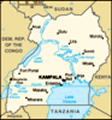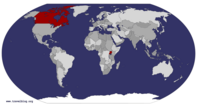Advertisement
Published: July 23rd 2019

 Baby Brooke & Sir Sarah
Baby Brooke & Sir Sarah
On our way back to Mbarara--the shenanigans that happen after you leave a bunch of women cooped up together in a vehicle for far too long.Warning: extra long post ahead, to make up for the ever-growing gaps between posts. And Happy National Ice Cream Day! Technically it's an American thing, but I'm going to unofficially declare it as an international holiday as additional justification for my ice cream intake. 😉
We've been all over the place these past couple of weeks--first to Kampala, then Gulu, then back to Kampala, and coming "home" to Mbarara last Monday. We got scooped up into some of the behind-the-scenes work that goes into our supervisors' research with adolescent nutrition and sexual/reproductive health and rights (SRHR). We sat in on some meetings with representatives from BRAC international (an organization that actively promotes and provides opportunities for the empowerment of women), and various universities and hospitals. It was very interesting to talk to the public health nurses and senior nutritionists at these facilities, and to get their perspectives on the challenges of adolescent pregnancies, difficulties of changing attitudes and engaging men in conversations around SRHR, malnutrition and micro nutrient deficiencies, food insecurity and current food policies, cultural sensitivity, and much more. I won't go into too much of the nitty gritty details, but there was plenty of information for

 Mulago Malnutrition Ward
Mulago Malnutrition Ward
As mentioned in the post: pretty much a nutrition student's paradise. both the nutrition and nursing students to geek out on and have percolating in our heads before our rotations in Mbarara hospital that started this week. It made me remember that there's a part of me that thinks pursuing a masters and doing research pertaining to community development would be so cool, but there's a bigger part of me that thinks it would be biting off way more than I can chew (for now--stay tuned to future Angela academic adventures).
Mulago hospital in particular was a nutrition student's paradise --it had a well-established oral rehydration centre and the malnutrition ward was separated into stabilization, transition, and rehabilitation units that followed highly structured feeding protocols and schedules. Although I appreciated the experience of the various site visits, it felt very rushed in comparison to our usual pace of life. After spending a month in Rugazi, I had gotten used to settling in to one community and calling it home. It felt almost surreal being torn away so suddenly and shuttled around in the busiest, sensory-overload city in Uganda to various meetings that were way over our little student heads. I think my experiences in big cities in China prepared me

 The Kampala Team
The Kampala Team
We were all ready to head back after a week of research, reflection, and really great food.
for the hustle and bustle, but it felt strange to go from living simply to living the privileged tourist life. To put it in figures, it's quite a stark contrast paying little over 100000 shillings (30ish dollars) for a month compared to 500000 shillings (150ish dollars) for a week. Not surprising though, since I'll admit we splurged on some fabulous comfort foods like chicken and waffles, pizza, shawarma, pad thai, and--also not a surprise--ice cream. Mmmmmm.
There was a lot to process from our weeks in Rugazi and even though we were still in the same country, you could say we experienced a bit of a culture shock. Also, although we are definitely still tourists in a sense, after over two months in Uganda and living like locals (or at least trying to) we didn't like being lumped in with the rest of the
mzungu tourists. We did do some touristy things on this trip, though, such as stopping at Murchison falls and a craft market run by the Amani Women Network. The latter is an initiative that across Africa; in Uganda it directly supports women who were abducted by the Lord's Resistance Army (LRA) and shunned from their

 Hospital, Here we Come!
Hospital, Here we Come!
We're so thankful that Sheila (right) gave us crazy Canadians the go-ahead to be here at the hospital. :)communities upon their return, since many were raped and thus deemed to be "tainted". Watching the women hard at work at their respective sewing machines, a child (or multiple children) at their hip, I was overwhelmed by their resilience--in the face of unthinkable and dehumanizing circumstances, they carried themselves with so much dignity and purpose. It was a brief visit, but definitely a worthwhile stop for us to make.
Since getting back to Mbarara we have been all-in at the hospital (except for Rayden, who is vaccinating goats all day in nearby villages). The nursing students have been spread out in surgical emergency and labour/delivery wards while the nutrition students hover around the pediatric wards. Within the pediatric wards we rotate between admissions, the stabilization unit ("Toto" ward, nutrition corner), and transition/rehabilitation unit ("Natasha" ward). It's been an amazing time working with the Ugandan nutrition students on the wards. Not only can we share in the sorrows of being one of the most misunderstood health professions (no, we are NOT the food police...) but we can also compare our programs and learn from each other. One difference is that the protected term for a nutrition professional in Uganda is "nutritionist" whereas in Canada it is "dietitian". Free tip for those of you who have continued to stick with this blog: if you want to stay in the good graces of any nutrition student/dietitian in Canada, please don't refer to people in my profession as "nutritionists".
Also, it sounds like most nutrition students go on to work in the community setting--providing nutrition education in villages and refugee camps. There aren't a lot of clinical positions available in the hospital settings, and the roles that do exist are more graduate-level public health dietitian roles. We have learned a lot about managing severe acute malnutrition (SAM) in children: types of feeds, assessment techniques, counselling families, progression of care, and follow-up. I feel like a sponge, soaking in all the different cases, cross-cultural nuances, and new experiences here at the hospital. I also feel like I'm being wrung out physically and emotionally, even though I've mostly been working only in the mornings. Although I enjoy working with the pediatric population, I find it especially hard to see children that are very sick, and in Canada I had never encountered severely malnourished children.
It has been challenging to see how even being in a regional referral hospital offering some of the best care in the country, there are many things that would be considered standard in Canada that can't be offered here. For instance, there was the case of a child refugee that had TB, HIV, and a tumour. Due to the chemotherapy treatment he was on, he was nauseous and unable to stomach the ready-to-use therapeutic food (RUTF) that is the standard feed given before discharging patients with SAM. He definitely had a functioning gastrointestinal tract but I was surprised to learn that for patients who do not have that function, parenteral nutrition (feeding intravenously) is not an option here, and the only other option when they can't feed by mouth is using a nasogastric tube where the feed is not given at a controlled rate. Although my three years of nutrition training are certainly useful, there are many times where I can feel frustrated by the fact that I have to throw that training out the window because of a lack of applicable resources to make it possible to practice what I have learned. Textbooks and lectures in Canada can only go so far in Uganda, where I am learning and relearning so many things on the daily. I am impressed with the resourcefulness of the healthcare workers here, working with what they have--although it's definitely a lot more than what was available in Rugazi, a hospital in Uganda certainly does not run the same as a hospital in Canada.
On a lighter note, we've learned some secrets about how not to be a hospital tourist: 1) Stay put -- resist the urge to just hop around from ward to ward and gawk. Since we only have less than 3 weeks here, we hope to really invest and get depth of experience by staying put in one area of the hospital instead of trying to squeeze in a bunch of places.
2) Learn the language -- as we discovered during our time in Rugazi, even just knowing how to say simple things like "hello, how are you?", "good morning", and "where is the pain" can go a long way to building more rapport.
3) Divide and conquer -- try not to work in the same place at the same time. This means splitting up day/evening/night shifts if you're a nursing student, or rotating throughout different ward areas if you're a nutrition student. Trust me, one (mostly) unhelpful mzungu student is enough at one time.
Looking back at this past week, what stands out in my mind is how the doctors, nurses, nutritionists, kitchen staff, and students/interns have been such excellent teachers and guides for helping us navigate the Ugandan healthcare system and ways of doing things here. One of the nurses who gave us a tour went above and beyond and treated us to some delicious, nutritionist-made juice downtown (who knew you could put garlic in juice and have it still taste good?). There are countless other stories of kindness shown and connections made that I'll try not to get all sappy over until maybe the last post, and I'm sure there will be lots of other moments before we leave Mbarara at the start of August. Can you believe I only have a month left in country? I'm sorry to say, soon enough I'll be back in Saskatchewan to haunt you. Until then, I am looking forward to making the most of my time here in hospital, with my team, and making other miscellaneous memories to be shared in future posts.
Ninkukunda munonga / Lots of love,
~Angela
Advertisement
Tot: 0.106s; Tpl: 0.019s; cc: 7; qc: 50; dbt: 0.0535s; 1; m:domysql w:travelblog (10.17.0.13); sld: 1;
; mem: 1.2mb








